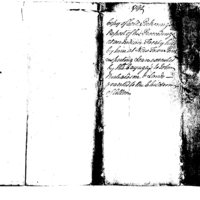Inducements to ratify Indian treaty
Item
Type
Copy of document
Title
Inducements to ratify Indian treaty
Description
Report describing what is necessary to induce the Indians to ratify certain provisions of a recent treaty.
year created
1791
month created
08
day created
16
author
sent from location
Philadelphia
recipient
in collection
in publication
in image
notable person/group
Henry Knox
Timothy Pickering
John Richardson
Cayuga
Ebenezer Allen
Six Nations of Indians
Seneca
Morris & Ogden
George Washington
Mr. Morris
Cayuga
Col Brinton Paine
Jonathan Stagg
Indians
Iroquois
notable location
Philadelphia
New Town Bank
Massachusetts
United States
Cayuga reservation
Seneka & Cayugas Lakes
notable item/thing
Indian treaty
lease
lands
information
report
proceedings
late treaty
children
women
grantees
pre-emption
they had no cause of jealousy or discontent
ratification
assignment to their two children
proposition
improvements of civil life
husbandry
improved state was the great object
chiefs
anxiety
instruction, children
they should receive necessary aid
Indians
culture
residue
exchange for a full supply of domestic animals
implements of husbandry and other necessities
condition
intimated
extinguishing the Indian title to any lands he had bought of Massachusetts
countenance
lease
pre-emption right was in the State of New York
session of the legislature
statutes
acted
late session (I think last winter)
petition
water communication
assembly
legislative sanction
presumption of its truth
evidence
case
judge
country court at Newton
information
notable phrase
I saw no way of avoiding the ratification of the assignment to their two Children, without reviving or rather exciting their utmost jealousy as it would have been denying the free enjoyment of their own lands by some members of the nation according to the will of the nation and a denial I was apprehensive would lead them to thing that the solemn assurances of the President were made but to amuse and deceive. Here you see my great inducements to the ratification. but improvements in husbandry could not take place without exclusive property, that the improver might enjoy the fruit of this labor. Neither could the improving husbandman exist without the Smith and the Carpenter, and his flax and wool would furnish employment to the spinner and weaver. These were all the manual arts I Mentioned. Instruction in the arts of treading and writing was at least equally desirable to the Indians. The obvious consequence of such improvements is the separate enjoyment of lands, the nature and advantages of such improvements were explained and appeared to have been fully understand by the five nations and they have explicitly agreed to adopt them. They only wait for the assistance which they were assured the United States was ready to afford them. Should that assistance prove successful (for this stage of the business I cannot entertain a suspicion that such assistance will not be furnished) it will tend to defeat the pre-emption right altogether. The inducements to this ratification were similar to those in the case of the assignment to Allan's children. the ratification of that assignment, I subjoin as copied from my rough draught in which I do not remember that any alterations were made. The foregoing detail I have given as the matters rest upon my mind. I wished to have avoided meddling with them but I could not devise no way of doing it without exciting or confirming jealousies which it was the great object of my mission to prevent or remove. PS. I might have mentioned that Mr Allan declared that the would make to Messrs Morris & Ogden a reasonable compensation for their pre-emption right to the land assigned to his children.
copy.
document number
1791081600001
page start
1
number of pages
14
Item sets
Document instances
| In image | In source | Location in source | |
|---|---|---|---|
| [view document] (13 pages) | AEI04 (14 pages) | Collection: Henry Knox Papers | B:7, I:1 |
| [view document] (0 pages) | [no image] | Publication: American State Papers | [unknown] |
Document names
| Type | Name | Location | Notes |
|---|---|---|---|
| Author | Timothy Pickering | Philadelphia | [n/a] |
| Recipient | Henry Knox | [unknown] | [n/a] |

